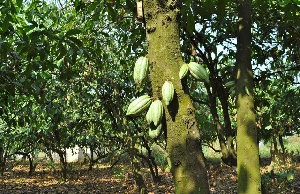A group calling itself the Ghana Agricultural and Rural Development Journalists Association have petitioned parliament to make laws to protect cocoa trees and cocoa farms across the country, which, they say, are under serious attack.
The group wants such a law to make it mandatory that requisite permit is sought from an appropriate government institution like COCOBOD before cocoa trees can be brought down under any circumstance.
They also want the government to put in place remedial measures that will make the cutting down of cocoa trees without reasonable justification, a criminal offence, pending the passage of the law.
Their petition comes in the wake of reports that hundreds of cocoa farmers, especially in the Western Region, are cutting down their trees to pave the way for rubber plantations.
Below is the full petition:
PETITION REQUESTING LEGISLATION TO PROTECT COCOA FARMS
We write to you from the Ghana Agriculture and Rural Development Journalists Association (GARDJA), petitioning you for a legislation to be enacted to protect cocoa trees and cocoa farms across the country, which are currently being destroyed without mercy.
As you are aware, cocoa plays an important role in the economy of Ghana.
According to the Ghana Cocoa Board, the cocoa industry employs approximately 800,000 farm families spread over six of the 10 regions of Ghana. The crop is said to generate about $2 billion in foreign exchange annually and is a major contributor to the government revenue and gross domestic product.
We are bringing to your kind attention a serious development that is negatively impacting the cocoa sector heavily; the destruction of cocoa farms to make way for other non-equally economically sound activities over the last five years.
More than 4,000 acres of cocoa farms have been destroyed in the Eastern Region, alone, according to estimated figures from farmers in communities such as Asiam in the Ayensuah North District, as well as Asikasu and Akim Breman in the Upper West Akim District. Hundreds of farmers have been left jobless as a result.
Kindly note that these are conservatively estimated figures from the beginning of the year and we are sure more of such destruction has happened since.
Lands that were in use for cocoa farming have now been taken over for rubber plantations, most of the times, without the consent of the cocoa farmers themselves.
Rich people and companies developing such rubber plantations grab the lands from chiefs higher up without recourse to traditional leaders on the ground.
They then move in and turn the cocoa farms into rubber plantations. In the process, thousands of cocoa trees are destroyed on the land without recourse to the due procedure.
In this country, cocoa farmers are required by law to sell the commodity to the government only, through licensed buying companies registered by COCOBOD.
It is illegal for individual farmers to export cocoa because the government deems it a key commodity that is helping sustain the economy.
The government is so protective of the cocoa pod. So, why should we treat the tree that bears the pod with such carelessness to the extent that anyone can get up and go cut down the tree without sanction? This should not be happening in any serious country.
In the Ashanti Region, the destruction of cocoa farms, mainly from the activities of illegal miners, is very troubling.
The problem is predominant in the Amansie West and East Districts as well as Ejisu, and the Asante Akyem Central and North Districts.
Despite the progress being made with the fight against illegal mining, such destruction to cocoa trees to make way for illegal mining have continued to date. Again, without adequate compensation for cocoa farmers whose fields are affected. This must stop.
The implication of the continuous destruction of cocoa farms could be dire for our country. It has great risks for the economy because we continue to lose foreign exchange which could threaten the very fundamentals of our economy.
A lot of money from cocoa is pumped into educational, health and road infrastructure in this country annually which will be lost if we continue to destroy our cocoa trees. And the environment is being badly damaged as these cocoa trees go down.
On behalf of our members and silent cocoa farmers, we present this petition to you requesting you to kindly help to enact laws to protect cocoa trees and farms.
This law should make it mandatory that requisite permit is sought from an appropriate government institution like COCOBOD before cocoa trees can be brought down under any circumstance at all.
Also, we are humbly requesting that you prevail on government to put in place remedial measures as we await the passage of laws to make it a criminal offence to cut down cocoa trees without a reasonable justification.
We are aware that you have been very definite that the constitution allows for MPs to move private member motions for the house to enact legislations.
We will be glad if the house, particularly, the Committee on Food, Agriculture and Cocoa Affairs can take this up and help bring into force legislation to save our cocoa industry.
Thank you!
Kind regards,
Richmond Frimpong
President
Ernest Adu
General Secretary
Business News of Thursday, 18 October 2018
Source: classfmonline.com
Protect cocoa trees with laws – Group
Business
















